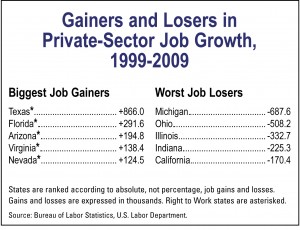Will Team Biden Weaponize Workers’ Pensions?
Big Labor abuse of worker pension and benefit funds as a means of advancing union bosses’ self-aggrandizing policy objectives is a familiar phenomenon.
Forced-Unionism State Employment Down by 1.9 Million Since 1999
Recently, millions of Americans have been dismayed by reports, based on official U.S. Labor Department Bureau of Labor Statistics (BLS) data, that from 1999 through 2009 our country endured a “lost decade” in private-sector employment.
In this context, the term “lost decade” refers to annual BLS statistics showing that in 2009 there were 107.95 million private-sector jobs nationwide, roughly 370,000 fewer than in 1999, when there were 108.32 million.
This marks the first time since the Great Depression that an entire decade has gone by with negative net growth in private-sector employment across the U.S.
However, some of the 50 states have fared far better than others over the past 10 years. And a review of how each state’s job market performed suggests that the U.S. Congress could dramatically improve America’s employment prospects for the next decade by adopting one simple change in federal labor policy.
Private-Sector Employment in Right to Work States up by 1.5 Million Since 1999
Current federal labor law authorizes and promotes the payment of compulsory union dues and fees as a condition of getting or keeping a job.
 Under pro-forced unionism provisions in the 1935 National Labor Relations Act (NLRA) and the 1951 amendments to the Railway Labor Act (RLA), an estimated 6.6 million private-sector employees must pay dues or fees to their Big Labor monopoly-bargaining agent, or face termination from their jobs.
Under pro-forced unionism provisions in the 1935 National Labor Relations Act (NLRA) and the 1951 amendments to the Railway Labor Act (RLA), an estimated 6.6 million private-sector employees must pay dues or fees to their Big Labor monopoly-bargaining agent, or face termination from their jobs.
At the same time, thanks to many years of vigilant efforts by freedom-loving Americans, federal labor law continues explicitly to recognize states’ option to protect employees from forced union dues and fees by adopting Right to Work laws.
Currently, 22 states have Right to Work laws on the books prohibiting the firing of employees simply for exercising their right to refuse to join or bankroll an unwanted union.
A huge majority of the 22 Right to Work states actually experienced net gains in private-sector employment from 1999 through 2009. Overall, private-sector employment in Right to Work states is up by roughly 1.5 million since 1999.
Meanwhile, the 28 forced-unionism states collectively endured a “lost decade” in employment growth far more bleak than that of the nation as a whole. In these states, private-sector employment is down by 1.9 million since 1999.
All five of the states enjoying the biggest net absolute increases in private-sector jobs since 1999 have Right to Work laws on the books. Not one of the five states experiencing the worst private-sector job losses has such a law. (See the table above for details.)
“Leading labor economists such as Dr. Richard Vedder of Ohio University have shown repeatedly that forced unionism hinders employment growth,” noted Mark Mix, president of the National Right to Work Committee.
“Big Labor’s counterproductive work rules and fomentation of the ‘hate-the-boss’ mentality lead to less employment growth or, very frequently, employment losses in the unionized businesses themselves.
“On top of that, union bosses funnel a huge chunk of the forced dues and fees they collect with federal labor law’s abetment into efforts to elect and reelect state and local, as well as federal, Big Labor politicians who support higher taxes and more red-tape regulation of businesses.”
‘Actions of Forced Dues-Funded Politicians . . . Result in Less Job Growth’
“The actions of forced dues-funded politicians thus result in less job growth, period. And, of course, union-label politicians do the most damage in the states where union bosses rake in the most forced-dues money,” Mr. Mix added.
“Moreover, in today’s globalized economy, when Big Labor militancy squashes job-creating business investment in a state, some investment is likely to go overseas. Then no American workers end up getting the jobs.
“But if Congress repealed all the forced-dues provisions in the NLRA and RLA, this massive impediment to employment growth nationwide would immediately be lifted.
“Forced-dues repeal would spur job growth in all 50 states. Businesses based in current Right to Work states would share the benefits as their major out-of-state suppliers and customers were freed from the burden of compulsory unionism.
“Today, there would be an additional 4.42 million U.S. private-sector jobs if private-sector employment nationally had increased exactly as much as it did in Right to Work states over the past decade.
“That gives you some idea of the extent to which American employees and businesses would benefit over the next 10 years if Congress and the President stood up to Big Labor and enacted a national Right to Work law now.”
President, Congress and Governors Remain Beholden To Union Special Interests
Unfortunately, despite nationwide unemployment that hovers near 10% and the widespread economic hardship resulting from most businesses’ lingering inability to hire more workers profitably even as the country reemerges from the 2008-2009 recession, Washington, D.C., keeps moving in the wrong direction.
“In January 2009, when it was already clear the economy and the job market were in dire straits, Sen. Jim DeMint [R-S.C.], working hand-in-hand with the Right to Work Committee, secured a Senate floor roll call on a forced-dues repeal amendment,” recalled Mr. Mix.
“But a majority of senators, including 14 who are seeking reelection or full terms this year, kowtowed to Big Labor and voted for federally-imposed compulsory union dues.
“And a majority of senators and House members and President Obama are all on record in favor of S.560/H.R.1409, the cynically mislabeled ‘Employee Free Choice Act,’ which would enable union bosses to grab forced-dues power over millions of additional private-sector workers.
“This year, several governors are also ignoring the economic facts and endorsing schemes to expand Big Labor’s forced-dues privileges.
“For example, Big Labor Iowa Gov. Chet Culver [D] is backing H.F.2420, legislation that would gut the Hawkeye State’s Right to Work law, even though Iowa’s long-term economic growth is far superior to that of Midwestern forced-unionism states like Illinois, Indiana, Ohio and Michigan.”
Politicians May Pay a Steep Price This Year For Backing Forced Unionism
In the recent past, union-label politicians have sometimes gotten away with supporting anti-growth labor policies, because most voters believed the economy was performing well enough, and didn’t see a pressing need for improvement.
However, in the harsh economic climate of 2010, citizens are unlikely to be so tolerant of federal and state politicians who pander to Big Labor.
“In their federal and state candidate Survey 2010 programs, the National Right to Work Committee and allied regional and state organizations have already begun mobilizing millions of citizens to contact their politicians regarding their compulsory-unionism records,” said Mr. Mix.
“It’s likely politicians will pay a steep price this year for backing compulsory unionism.
“But there’s still time for many politicians who up to now have been Right to Work opponents to make amends with freedom-loving citizens by pledging publicly to oppose forced unionism 100% of the time in the future.
“Federal and state politicians who are running for election or reelection this year can accomplish this objective by completing, signing and returning their 2010 Right to Work candidate surveys.
“Long experience shows that election time is the best time for Right to Work advocates to change Big Labor-appeasing politicians’ minds about the forced-unionism issue. I urge Right to Work members and supporters everywhere to participate in the Survey 2010 program.”

Big Labor abuse of worker pension and benefit funds as a means of advancing union bosses’ self-aggrandizing policy objectives is a familiar phenomenon.

Leaked CTU Proposals Won’t Do Anything to Improve Schools’ Poor Performance

What impact does handing a union monopoly power to deal with your employer on matters concerning your pay, benefits, and work rules have on your pay?